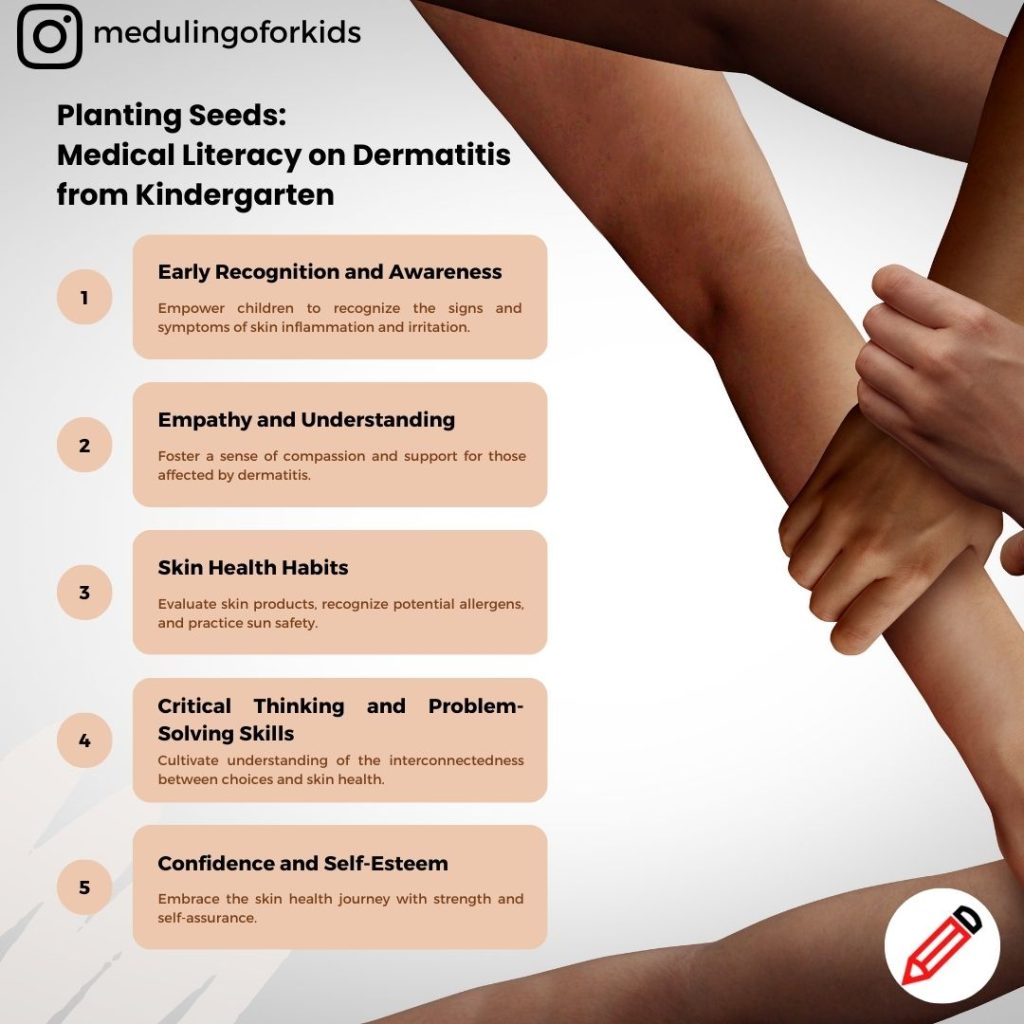In early childhood education, laying the groundwork for medical literacy on dermatitis from kindergarten emerges as a pivotal step towards promoting skin health, empathy, and informed decision-making. Dermatitis, a common skin condition characterized by inflammation and irritation, affects individuals of all ages and backgrounds, making it essential for children to develop an understanding of dermatitis from an early age. By introducing age-appropriate concepts and resources like A to Z Childhood Rashes, educators and parents can empower children to recognize, prevent, and manage dermatitis effectively, fostering a culture of skin health and well-being that lasts a lifetime.

1. Early Recognition and Awareness:
Kindergarten marks the beginning of a child’s formal education journey—a time ripe with opportunities to instill foundational habits of health and wellness. By introducing medical literacy on dermatitis, educators and parents empower children to recognize the signs and symptoms of skin inflammation and irritation. From discussing the importance of safe skincare practices to teaching strategies for preventing common dermatitis triggers, children gain valuable insights into maintaining healthy skin from an early age. Early recognition and awareness of dermatitis in kindergarten set the stage for proactive self care and informed decision-making regarding skin health throughout life.
2. Promoting Empathy and Understanding:
Medical literacy instruction on dermatitis fosters empathy and understanding towards individuals living with skin conditions. Kindergarten provides an environment for nurturing empathy through storytelling, discussions, and role-playing activities. Children learn to empathize with their peers who may experience stigma, discomfort, or distress due to dermatitis, fostering a culture of inclusion and acceptance within the classroom and beyond. By promoting empathy and understanding from kindergarten, educators foster a sense of compassion and support for those affected by dermatitis.
3. Empowering Skin Health Habits:
Developing medical literacy on dermatitis from kindergarten empowers children with practical skills and strategies for proactive skin care. Educators and parents can teach children about the importance of avoiding common allergens and thoroughly rinsing off soaps or shampoos to prevent skin irritation and inflammation. Through hands-on activities and demonstrations, children learn how to evaluate skin products, recognize potential allergens, and practice sun safety measures such as wearing protective clothing or seeking shade. Empowering learners from kindergarten instills lifelong habits that support skin health and protect against dermatitis triggers, promoting overall well-being and confidence in children.
4. Nurturing Critical Thinking and Problem-Solving Skills:
Engaging with medical literacy on dermatitis fosters critical thinking and problem-solving skills essential for navigating skin health challenges. Children learn to identify common dermatitis triggers, such as chemical or environmental allergens, and develop strategies for managing flare-ups and discomfort. By exploring the role of diet, lifestyle, consumer choices, and environmental factors in skin health, children cultivate a deeper understanding of the interconnectedness between these elements and skin well-being. Nurturing critical thinking and problem-solving skills from kindergarten empowers children to make informed decisions and take proactive measures to protect their skin health throughout life.
5. Building Confidence and Self-Esteem:
Developing medical literacy on dermatitis from kindergarten builds confidence and self-esteem in children living with skin conditions. By providing age-appropriate information and resources, educators and parents empower children to understand and manage their dermatitis effectively. Through positive reinforcement and encouragement, children learn to embrace their skin health journey with strength and self-assurance. Building confidence and self-esteem from kindergarten creates a supportive environment where children feel empowered to advocate for their skin health needs and navigate social interactions.
Start Medical Literacy on Dermatitis from Kindergarten
In conclusion, the case for starting medical literacy instruction on dermatitis in kindergarten with an activity book like A to Z Childhood Rashes is compelling, shaping the trajectory of individual skin health and overall well-being for generations to come. By empowering children with knowledge, empathy, and practical skills, educators and parents create a foundation for a lifetime of skin health awareness and proactive self-care. As we embrace the transformative power of medical literacy, let us nurture a generation of children who prioritize skin health, empathy, and informed decision-making from an early age, paving the way for a future where skin conditions are understood, accepted, and managed with compassion and empowerment.
Skin health matters.
===
Interested in teaching medical literacy pain free? Shop medical literacy resources!

This article was drafted by ChatGPT and edited by Joan Lee Tu, the founder of MedULingo.com.
You may also be interested in the following:
Clinical Reasoning in Grade Three with A-to-Z Medical History and Histology Lessons
How to Accommodate People with Chemical Allergies
Preventing Contact Allergies in Kids: A Guide for Parents – FREE DOWNLOAD
Consumer Literacy Scavenger Hunts – FREE DOWNLOAD
Eczema: The Contact Allergy Booklet
The Green Soap Girl and the Itchy Allergy
The Green Soap Girl Goes to the Beach
A to Z Medical Literacy: Childhood Rashes
A to Z Medical Literacy: Rare Allergies
Cultivating Allergy Awareness from Kindergarten with Medical Literacy
Planting Seeds: The Case for Developing Medical Literacy on Allergies in Kindergarten
The Benefits of Developing Medical Literacy About Dermatitis from Kindergarten
Planting Seeds: The Case for Medical Literacy on Dermatitis from Kindergarten
Safe Science: Guidelines for Handling Chemicals in Kids’ Science Activities
Safeguarding STEM Learning: Best Practices for Sanitizing LEGO in Education Programs
The Great Debate: Soap vs. Sanitizer in STEM Education Programs

